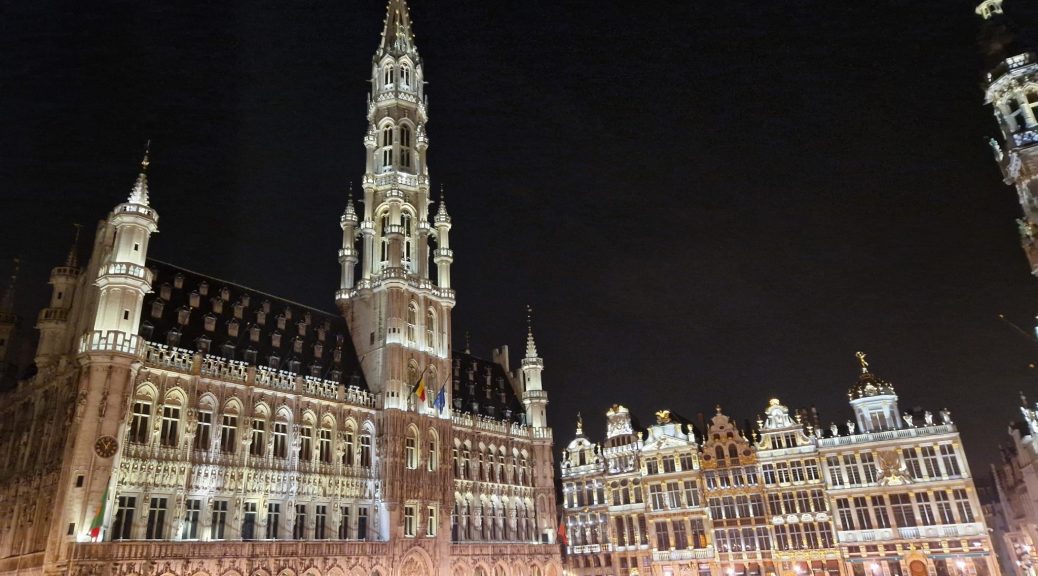
Conference Debriefing (36): EU Competition Conference
PDF Version: Click here
Suggested citation: Kirk/Bongartz, DKartJ 2023, 36
There are two types of visitors to Brussels: some spend Thursday evening on the Plux, marvelling at the view of the spectacularly illuminated Grand-Place and return home sleep-deprived with Belgian chocolates in their trunks. The others spend their time at conferences, absorbing the thoughts of the stars of the antitrust community and dreaming of the more economic approach on the way back in the red cushions of the Hogwarts Express Thalys. The authors of this article combined both in 26 hours in Brussels. Alexander Kirk and Philipp Bongartz describe their highlights of the EU Competition Conference.
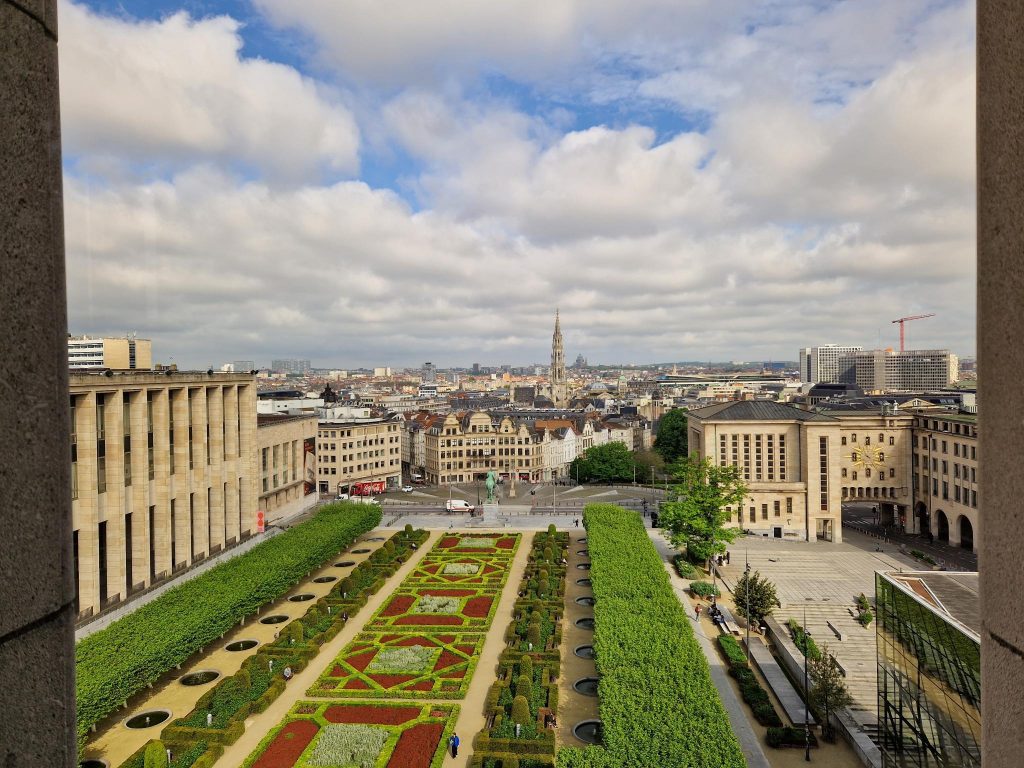
Hosts: CMS and the Institute for Competition Law (Heinrich-Heine University)
Place: SQUARE Conference Centre (Brussels)
Date: 11 May 2023
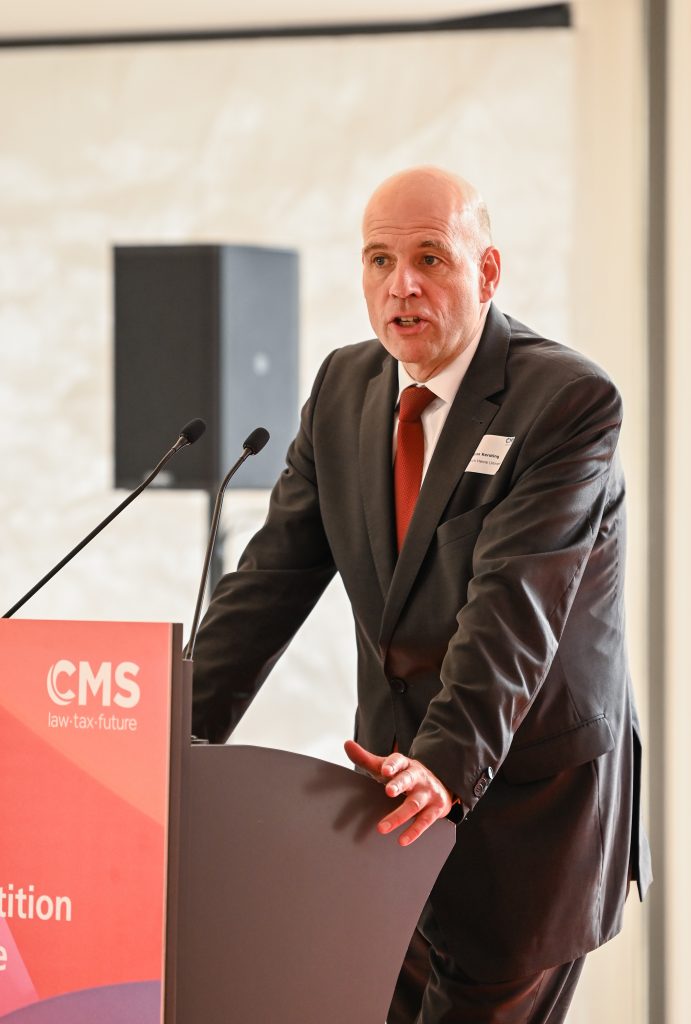
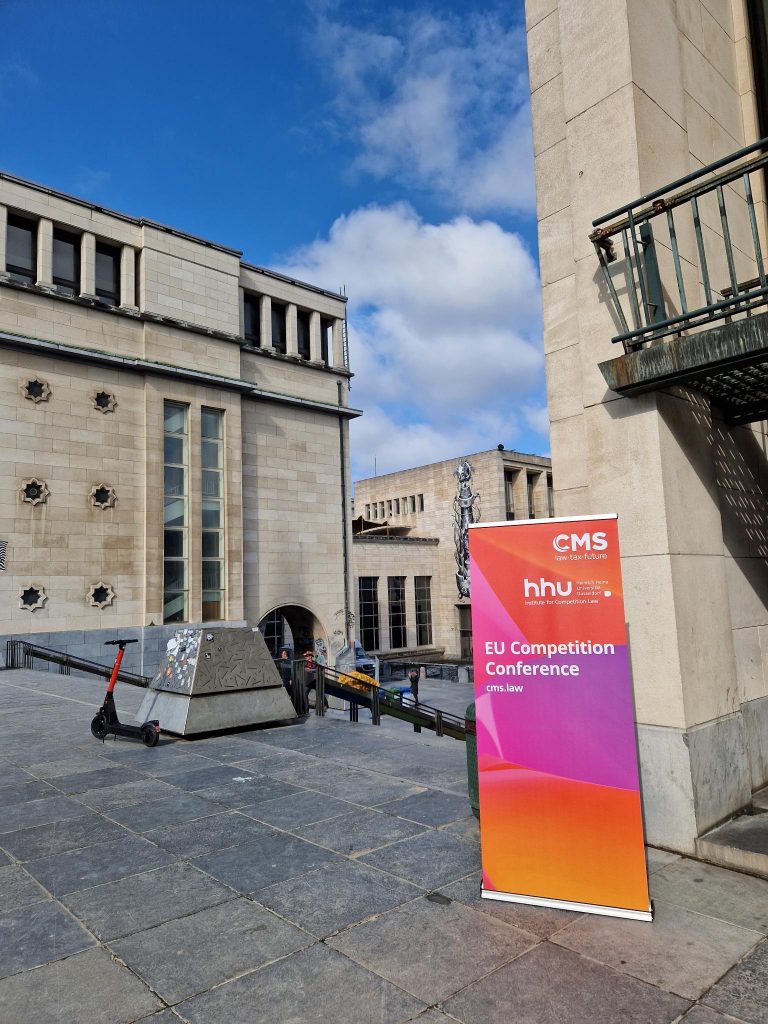
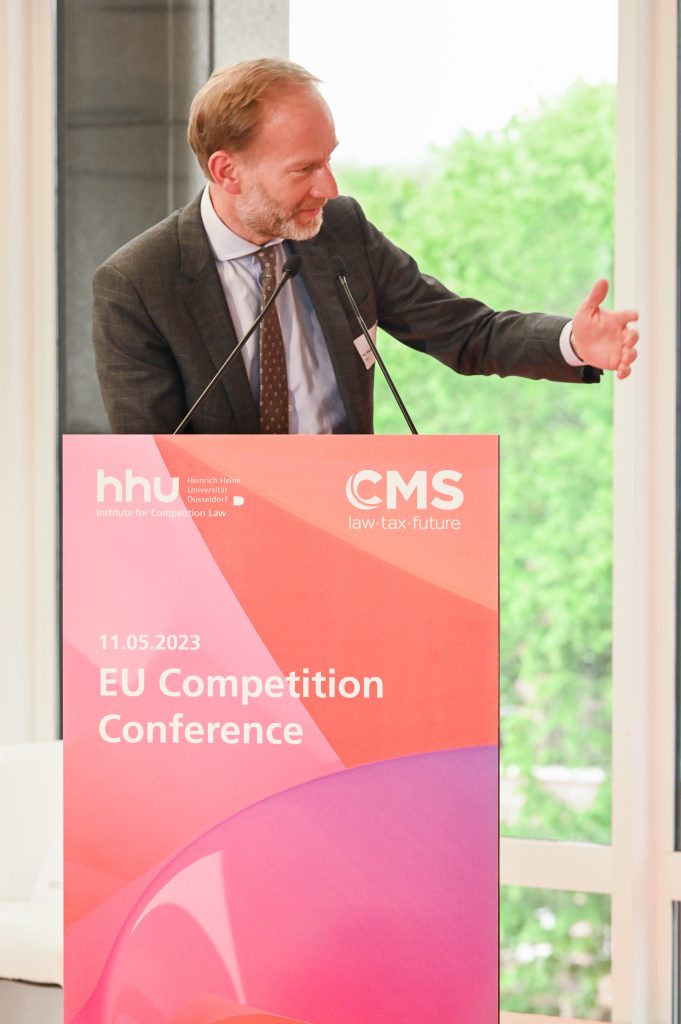
30 seconds of fame with Andreas Mundt
After the last conference in 2021 took place virtually, the who’s who of European competition law met in person this year. Andreas Mundt, President of the Bundeskartellamt, was of course a must-have. Co-host Michael Bauer (CMS) opened the talk with Mundt by explaining how you can tell that Mundt is a VIP: other guests boasted of riding up the elevator with him. (We don’t know if Olivier Guersent bragged about standing next to us in the elevator, too).
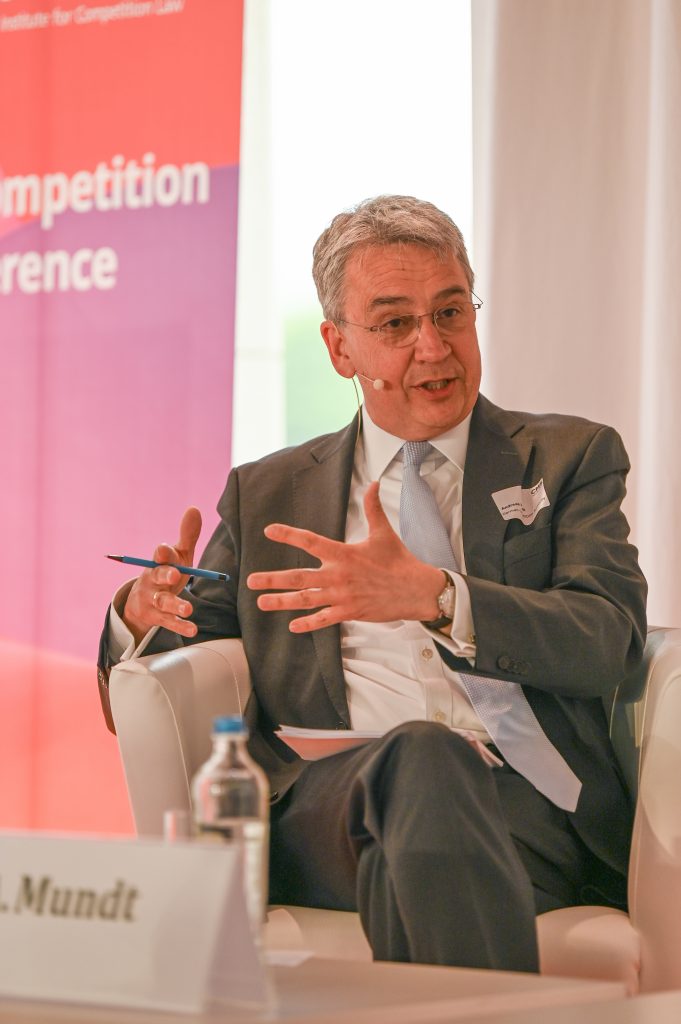
In the interview with Bauer and Annemieke Hazelhoff (CMS), Mundt talked about the regulatory density in Germany and Europe, i.e. the growing abundance of new regulations, laws, guidelines and other communications from the Commission. Mundt attributed this to the fact that in a fast-changing world, many rules require adaptation (even if not every change seemed mandatory to him).
One focus of the interview was on the topic of sustainability agreements, which are given a lot of attention in the Commission’s draft Horizontal Guidelines – and were further discussed at the conference in a separate panel by Daniela Esposito (Akzo Nobel) and Dirk Middelschulte (Unilever).
In view of the difficulties of reconciling competition and sustainability, Mundt relied on traditional German football wisdom: “the round has to go into the square” – “das Runde muss ins Eckige”. According to him, the Bundeskartellamt is discussing various approaches internally, with the federal government (regulation?) and at conferences (“if anyone of you has a better idea…”). The proposals recently presented by researchers from the Heinrich-Heine University (sorry, only in German, but with an English summary) form the basis as a “menu” of suggestions. Mundt sees the best contribution of the Bundeskartellamt – guidelines are not planned, at the most we can expect a paper summarising case practice – in deciding cases: “We want cases!” With regard to sustainability agreements, he encouraged companies willing to cooperate to enter into dialogue with the competition authority: A large part of them do not restrict competition, Mundt said, otherwise problems can be dealt with by employing the authority’s discretion.
Mundt also commented on the 11th amendment to the German competition act, in particular the planned sector enquiry with abuse-independent remedies. This “New Competition Tool” may be applied in many markets with a high degree of concentration. However, due to the lengthy procedure, the instrument could not be used to regulate short-term petrol price reductions. For an exemplary case in which an abuse-independent remedy was required, Mundt referred to the British airports: After the UK competition watchdog had certified a lack of competition at these airports in 2009, Heathrow Airport Holdings (at the time: BAA) had to sell Gatwick, Edinburgh and Stansted. The evaluation was positive: more passengers, lower prices, better service. Incidentally, Mundt complained about poor service of a platform through which he had reserved a flight and later rebooked it. Anyone who knows how the HRS proceedings got started can wipe the sweat from his brow: It was understood that Mundt sees no reason for a sector enquiry.
The big picture
…was covered with Guillaume Loriot, highest official in European merger control and Deputy Director-General of DG COMP. In the interview with CMS lawyers Christoff Soltau and Dieter Zandler, he spoke about the Commission’s 2021 Guidance on the application of the referral mechanism under Art. 22 ECMR. The Commission essentially encourages Member State Competition Authorities (NCAs) to refer to them mergers that do not meet the national thresholds. In Illumina/Grail (2022), the General Court gave its blessing to the new practice. Loriot defended the new approach: it achieves the intended increase in flexibility in merger control. Such mergers (2022: approx. 20 transactions) would come to the attention of the Commission through referrals by the NCAs, complaints or the parties themselves. The majority of proceedings could be resolved in informal discussions without the need for notification. When asked about opposition to the new practice among NCAs, Loriot stressed that the guidance only creates an opportunity for authorities, not an obligation.
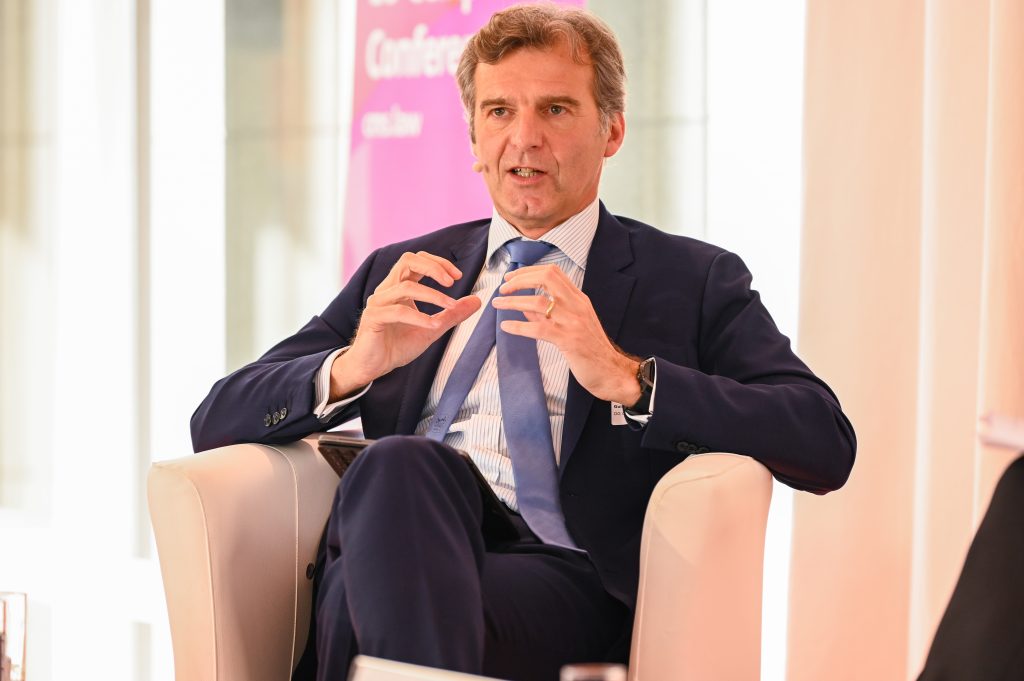
The discussion on mergers continued with the Towercast saga. In this year’s decision, the ECJ ruled that Art. 102 TFEU allows ex post control of mergers. Admittedly, the court had already taken this view 50 years ago. In the meantime, however, merger control systems had been introduced in the EU and all member states except Luxembourg. Asked whether he now expected a wave of enforcement by the NCAs, Loriot remained calm: The case would show the ECJ’s sensitivity to enforcement gaps which authorities and legislator see (as evidenced by Art. 14 DMA). However, the ex-post control of mergers would only be a safety net – the focus remains on the formalised ex ante system.
The big boss
Loriot’s boss Olivier Guersent, Director-General of DG COMP, was interviewed by Rupprecht Podszun (HHU) and Dirk Van Liedekerke (CMS). In response to the polite opening question “How are you?” Guersent answered open-hearted: He and his staff were tired and exhausted, good people had burn-outs, the crises were draining DG COMP. But then Guersent went galloping through competition law: during the pandemic, apparently everyone who had ever ordered a Frappuccino at Starbucks or flown with Lufthansa was assigned to the State Aid team, the interview then went on to the fundamental questions (“competition is not a goal, but a tool”) and – or as one of them? – the revision of the Horizontal Guidelines.
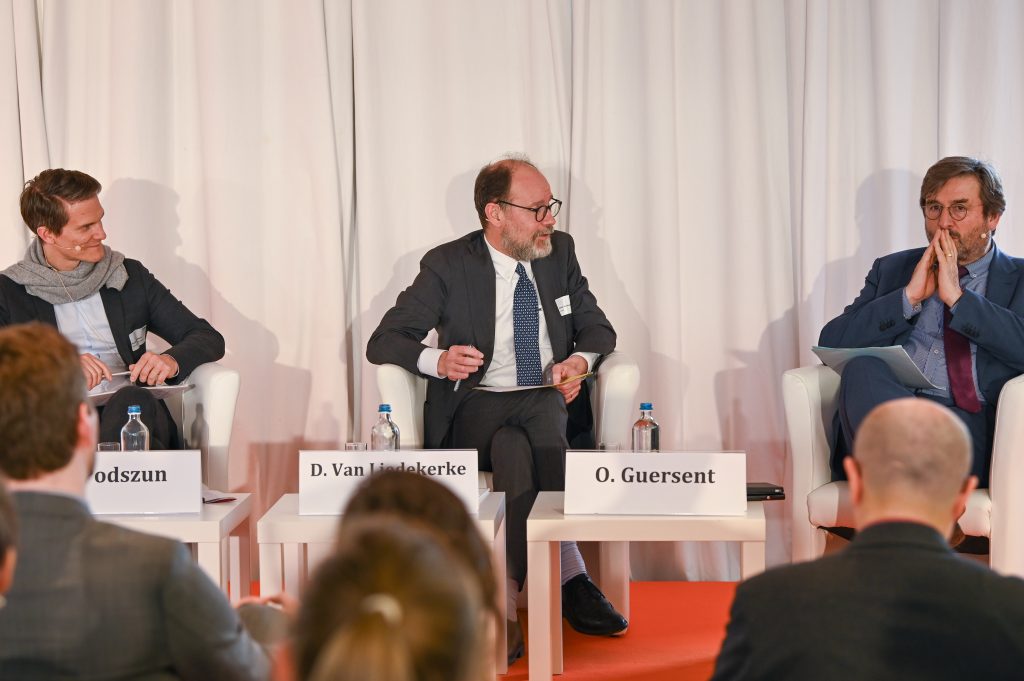
From there, it was not far to the twentieth anniversary of Regulation (EC) 1/2003. Guersent praised the system of self-assessment (“never get back to notification”) as the great achievment of the Regulation. For the upcoming revision of the Regulation, he wished that there would no longer be legal recourse against the rejection of complaints. Guersent expressly welcomed complaints, as they were an essential impetus for new proceedings. However, he does not want to see a considerable part of his staff engaged in explaining to complainants why the Commission might not care whether a judoka was allowed to participate in the Olympics.
Of course, no competition law regulation talk goes by without a question on the Digital Markets Act (DMA). Marc van der Woude, President of the General Court, recently said that he expects a “wave of litigation” on the DMA. Guersent has no doubt about this: lawyers would love to test new legal acts – why should it be any different with the DMA? This would be all the more likely because even supposedly simple questions are disputable, e.g. what constitutes a core platform service.
As a sidenote: DMA Lunch Talk (online)
Rupprecht Podszun and a great team of authors have issued a 686-page commentary on the DMA – at the moment only in German, but stay tuned for an English commentary… On the occasion of the publication, we are organising a DMA Lunch Talk & Book Launch (in English):
23 May 2023, 12.15 Uhr-13.15 Uhr: DMA – State of Play, Zoom
Thomas Kramler from the DMA team of the European Commission, Andreas Schwab (rapporteur on the DMA in the EU Parliament) and Sophie Gappa from the Federal Ministry of Economics and Technology will join – as well as most of the authors of the commentary.
To join us dial in here: https://tinyurl.com/DMALunch. For further information see: https://www.jura.hhu.de/en/lehrstuehle-und-institute/professuren-und-lehrstuehle-im-zivilrecht/chair-for-civil-law-german-and-european-competition-law/translate-to-english-digitalrecht
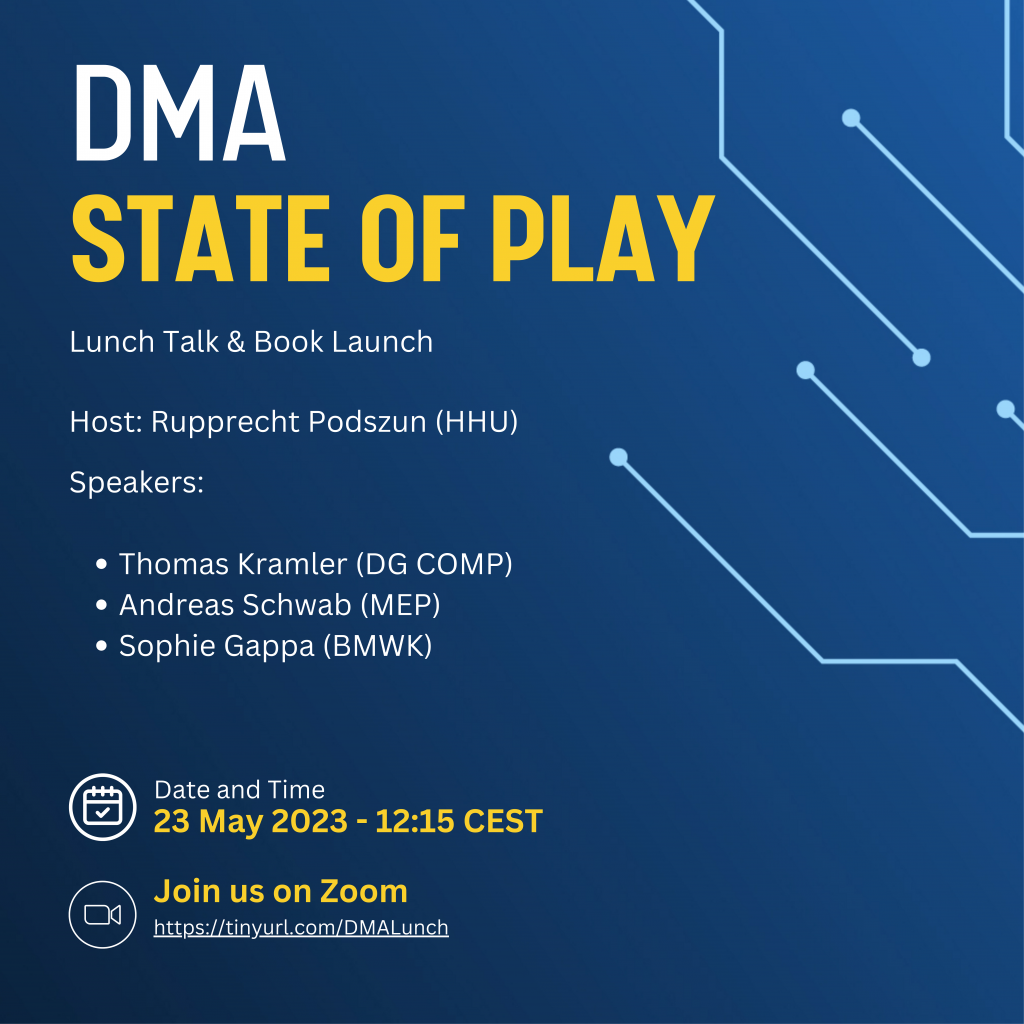
As for how the (European) courts should deal with the DMA, Guersent also had a rare piece of advice from the executive at hand: “A good way not to get paralyzed is to reject quickly!”
The new kid on the block
Of course, the DMA also got its own panel – after all, it has just recently entered into force (2 May). However, the panel with Sophie Gappa (BMWK), Gerhard Klumpe (LG Dortmund) and Carel Maske (Microsoft), hosted by Björn Herbers and Szabolcs Szendro (CMS), did not convey much of a honeymoon atmosphere: “The DMA is like a marriage. First, you are happy when it is concluded but then the real work starts.” (Gappa)
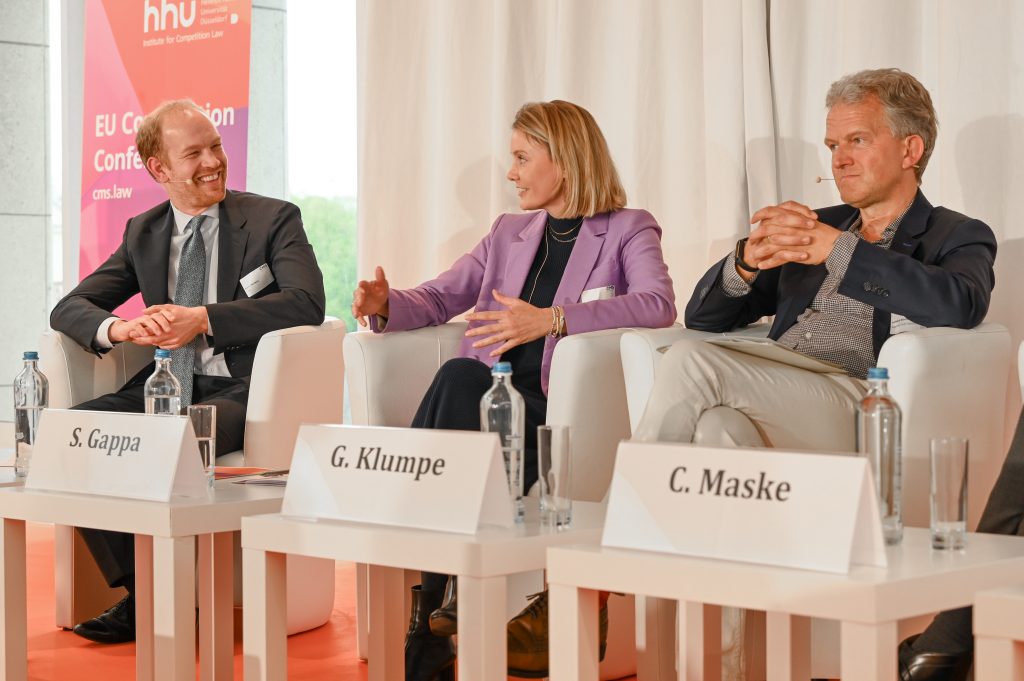
Klumpe warned not to put too much hope in DMA enforcement in the courts. (Maske nodded affirmatively.) Gappa countered that it was easier to implement a catalogue of dos and don’ts than the general “be good” requirement of Art. 102 TFEU. In our opinion, there is no point in “artificially” fabricating difficulties of interpretation. Let us do what (we) lawyers were trained to do: interpret the law.
At the end, Maske revealed that Microsoft will (probably) be designated as a gatekeeper due to at least two core platform services: Besides the Windows operating system – quelle surprise! – Bing also reaches the thresholds. He took it with a sense of humour: “Bing – that search engine that you should be using but only use to find Google.”
Let’s wrap it up
Space and the patience of readers are too limited for us to recount all the exciting discussions in detail, so let us speed it up:
Miguel Pérez (AB InBev), Aleksandra Boutin (Positive Competition) and Carlos Vérgez (CMS) discussed the new Commission guidelines on vertical restraints under the moderation of Malgorzata Urbanska (CMS). The criticism was less about the actual content, but more about the fact that the guidelines failed to reflect the serious changes in the market and in case law.
Three “focus sessions” dealt with private enforcement, the Foreign Subsidies Regulation and investment control. Kai Neuhaus (CMS), who lead through the event in a humorous and eloquent way, was – among others – part of the third session. Dealing with the first topic – discussed with Christian Kersting (HHU) – Avantika Chowdhury (Oxera) delivered a memorable quote: “As an economist I have an issue with [legal] presumptions – it is just arbitrary”.
A perfect starting point for the last panel, in which economists and lawyers got into a heated discussion: The debate was about the EU Commission’s new proposal on Art. 102 TFEU, for which there will now finally be guidelines (after this project had once failed and only the so-called Enforcement Priorities had prevailed). Damien Gerard (Belgian Competition Authority), who rushed to the panel from a Towercast (!) hearing, Simone Kohnz (ECA Economics) and co-host Rupprecht Podszun (HHU) argued about who or which profession should be dominant in setting the standards for abuse proceedings: What role should economics have in the case-by-case consideration of abuse cases? With skillful moderator Brian Sher (CMS), things got really emotional once again – to be continued. (By the way, the position of Podszun and Tristan Rohner on the Art. 102 consultation can be read here).
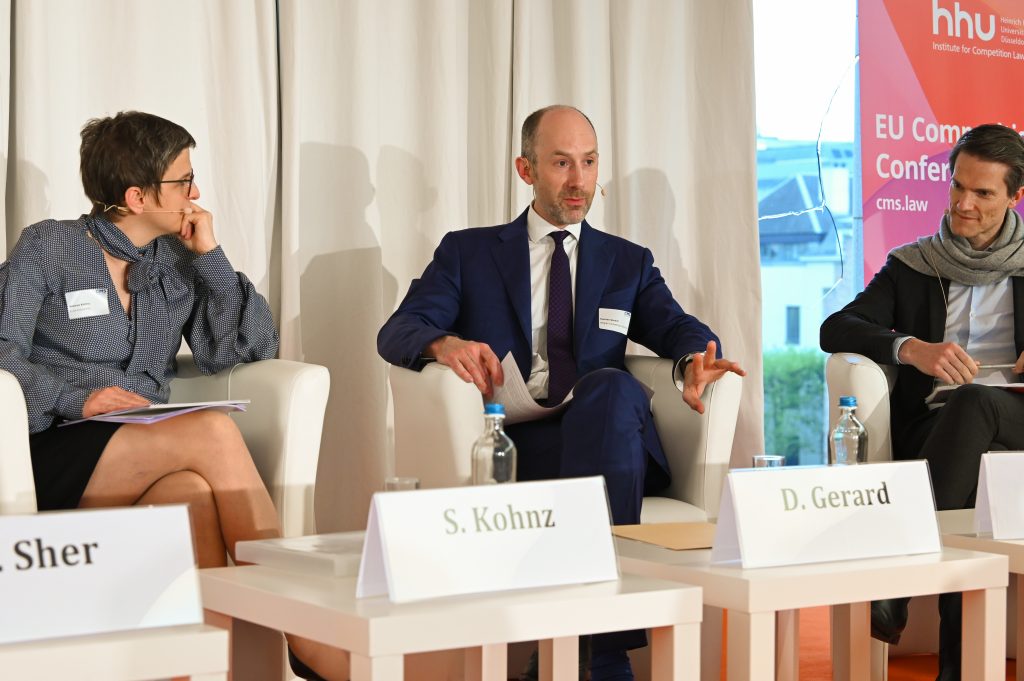
The grand finale took place in an impressive location: In (!) the BELvue Museum directly next to/in the Royal Palace, we enjoyed a champagne reception and dinner with a phenomenal view. Mr. DMA himself Andreas Schwab (who will also be at the DMA Lunch Talk on 23.5.2023) spoke about the relationship between regulation and competition in the European Union. What happened afterwards on the Plux remains on the Plux. We look forward to the next elevator pitch in Brussels!
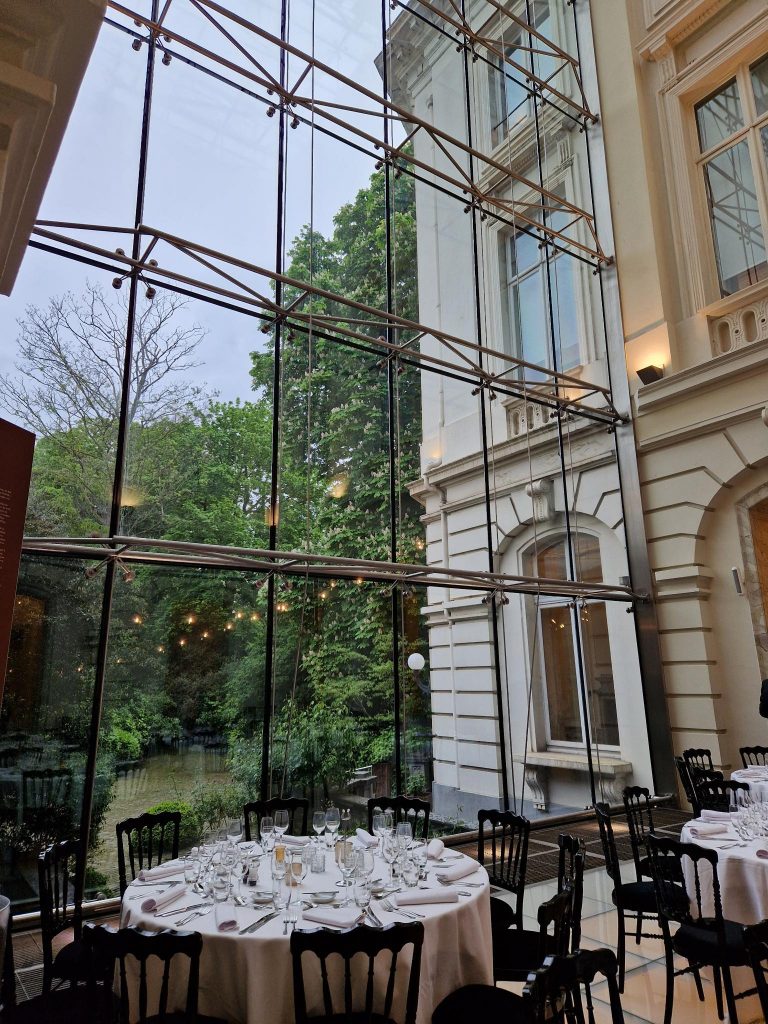
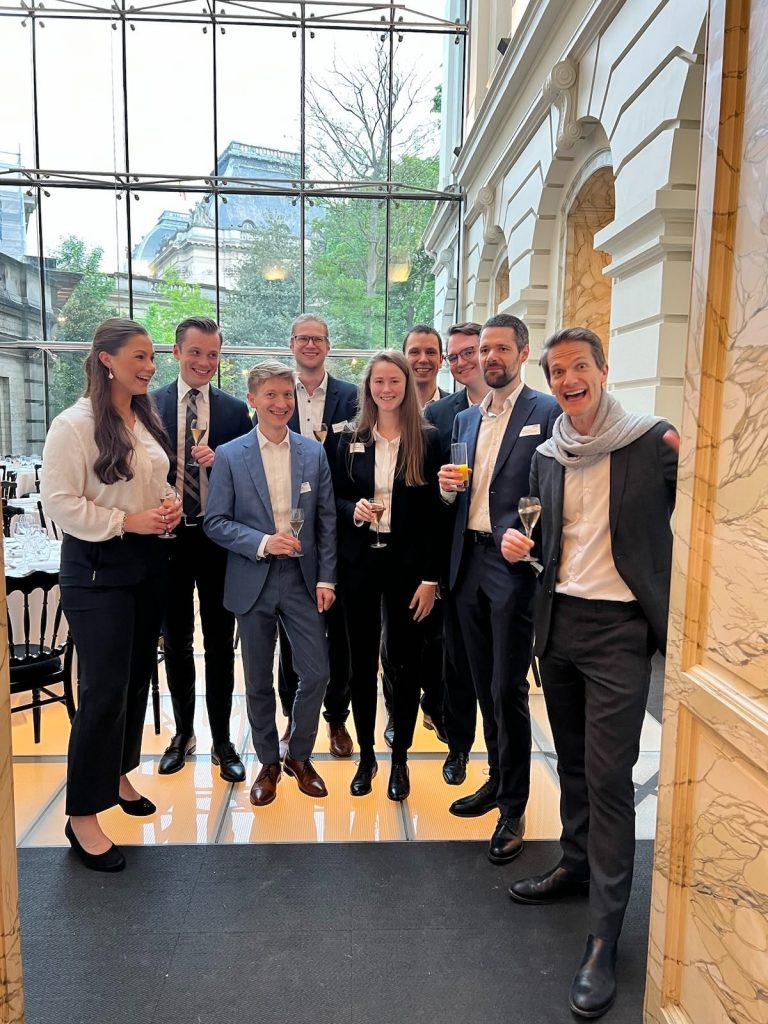
Alexander Kirk und Philipp Bongartz are research associates at the Chair of Civil Law, German and European Competition Law at the Heinrich Heine University Düsseldorf. They also contributed to the commentary on the Digital Markets Act. Pictures from CMS and the authors. Don’t forget our Lunch Talk (in English): 23.5.2023, 12.15 h Brussels time; join us via https://tinyurl.com/DMALunch!